Books
West County Writers Circle’s Book Launch : ‘A View From My Window’ at Occidental Center for the Arts August 31
Sunday, August 31 @ 4 pm. West County Writers Circle’s Book Launch : ‘A View From My Window’, authored by Beverly Riverwood, Diane Foti, Blythe Klein, Noel Bouck, Julie Middleton, Diane Masura and Andrea Van Dyke. Offering an innovative form of memoir writing, seven local women writers share the ‘view’ from each author’s life window; their lived experiences and personal and professional choices, beginning in the 1940s and extending into 2024. Dedicated to local legend Annie Murphy Springer, with remembrances by writer Andrea Granahan, this multi-layered, multi-viewpoint memoir collectively describes how personal, political and social change over this dynamic period affected their family and cultural life. Enjoy selected readings and photographs displayed by the authors, with musical offerings. Q and A , book sales & signing, refreshments. FREE event, all donations gratefully accepted. A portion of book sales supports OCA. 3850 Doris Murphy Ct. Occidental, CA. 95465. OCA is a community-based non-profit arts organization with volunteer staffing.
Books: ‘Zambia hasn’t evolved on LGBTQ+ acceptance, it’s going in the opposite direction’
Iris Mwanza’s debut novel The Lions’ Den is inspired by a real criminal case from Zambia that has stayed with her since the 1990s.
The book follows rookie lawyer Grace Zulu, who takes on the pro bono defence of Willbess “Bessy” Mulenga, arrested for an offence “against nature” and facing 14 years in prison.
For Mwanza, who grew up in Zambia and now works in the US as a staunch advocate for gender equality, the case is emblematic of wider struggles against injustice.
“Police brutality is a manifestation of impunity,” she tells PinkNews. “It’s happening everywhere, not just in Zambia or developing countries, it’s happening right here in this country [US]. And it’s the most vulnerable who suffer the most. I wanted to bring it to the fore unflinchingly.”
A climate of fear
Same-sex sexual activity remains prohibited under Zambia’s Penal Code, carrying a penalty of up to 14 years’ imprisonment. However, as noted by the Human Dignity Trust, a 2019 case saw two gay men convicted and sentenced to 15 years’ imprisonment for same-sex sexual activity.
“I feel like human rights are universal, and we all need to be fighting for them,” Mwanza says. “My motivation for writing the book was to show the impact of discrimination on families, communities, societies and the nation, and it’s bad. We are going in the opposite direction.”
She recalls that while living in Zambia she witnessed a “deeply homophobic society”, but law school opened her eyes to the fact that “almost all constitutions in the world guarantee fundamental human rights, so not only is it morally wrong, it’s legally wrong”.
On her last trip home, Mwanza met clandestinely with LGBTQ+ Zambians to protect their identities. “People have a legitimate fear of prosecution, but also persecution societally. They told me what hurt most was when their communities wouldn’t accept them.”
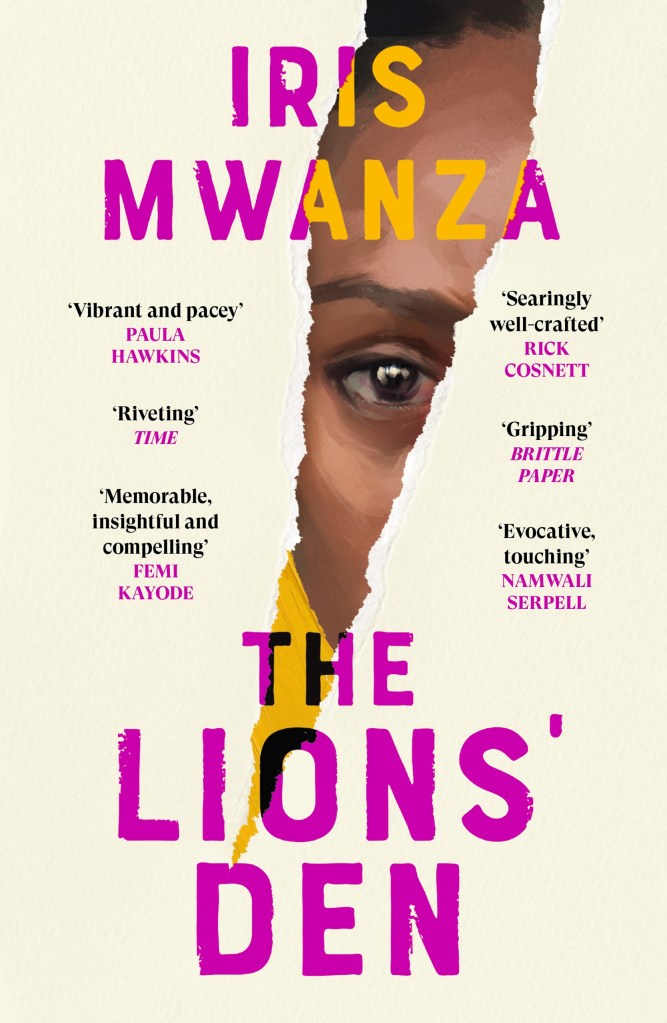
She recalled having “mixed feelings” upon holding the illicit book reading: “I was incredibly proud to be able to have a conversation with the community in Zambia and get honest feedback. It felt very gratifying to hear that they felt seen and appreciated that I’d written the book.
You may like to watch
“But it was also very sad, and deeply heartbreaking, that I grew up in a society that has not evolved – that’s actually going in the opposite direction, where people are afraid to just live their lives as human beings.”
‘Everybody has fundamental rights’
One thread running through The Lions’ Den is the influence of conservative religious movements. “Fundamentalist or deeply evangelistic religions can give cover to obnoxious, unacceptable behaviour,” Mwanza says. “It’s very systemic.”
Of Zambia’s regressive laws, she is blunt: “It’s baffling, especially when you see younger people being super conservative and not open-minded.” She links this to a wider culture of polarisation, both online and in politics: “The more extreme you are, the more responses you attract. Politicians take extreme positions to get attention.”
Mwanza is equally concerned by developments in the US, where she says the “gender space” is becoming politicised. “A lot of people of colour are leaving their positions because they don’t feel supported, or they were hired under DEI,” she says.
But she finds hope in young people: “They’re fighting and they’re willing to fight. The question is: how do we further empower the next generation to do things better than we did? We’ve taken things for granted,” she adds, pointing to the2022 overturning of Roe v Wade.
“I don’t think people really understand the consequences of an authoritarian government, but when everyone’s rights start getting stripped away, that’s another thing. Everybody has fundamental rights. It isn’t about your own individual prejudices, it’s about us all being human beings, and we all need and deserve protection.”
Edmund White, a groundbreaking gay author, dies at 85
Edmund White, the groundbreaking man of letters who documented and imagined the gay revolution through journalism, essays, plays and such novels as “A Boy’s Own Story” and “The Beautiful Room is Empty,” has died. He was 85.
White’s death was confirmed Wednesday by his agent, Bill Clegg, who did not immediately provide additional details.
Along with Larry Kramer, Armistead Maupin and others, White was among a generation of gay writers who in the 1970s became bards for a community no longer afraid to declare its existence. He was present at the Stonewall raids of 1969, when arrests at a club in Greenwich Village led to the birth of the modern gay movement, and for decades was a participant and observer through the tragedy of AIDS, the advance of gay rights and culture and the backlash of recent years.
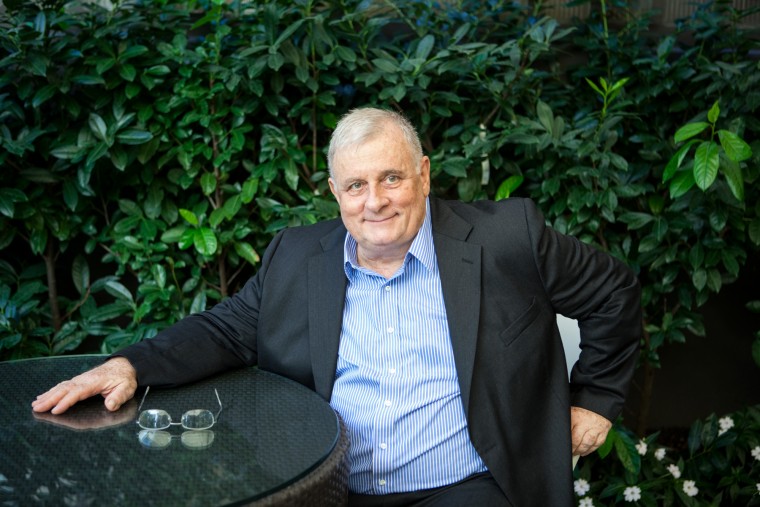
A resident of New York and Paris for much of his adult life, he was a novelist, journalist, biographer, playwright, activist, teacher and memoirist. “A Boy’s Own Story” was a bestseller and classic coming-of-age novel that demonstrated gay literature’s commercial appeal. He wrote a prizewinning biography of playwright Jean Genet and books on Marcel Proust and Arthur Rimbaud. He was a professor of creative writing at Princeton University, where colleagues included Toni Morrison and his close friend, Joyce Carol Oates. He was an encyclopedic reader who absorbed literature worldwide while returning yearly to such favorites as Tolstoy’s “Anna Karenina” and Henry Green’s “Nothing.”
“Among gay writers of his generation, Edmund White has emerged as the most versatile man of letters,” cultural critic Morris Dickstein wrote in The New York Times in 1995. “A cosmopolitan writer with a deep sense of tradition, he has bridged the gap between gay subcultures and a broader literary audience.”
The age of AIDS, and beyond
In early 1982, just as the public was learning about AIDS, White was among the founders of Gay Men’s Health Crisis, which advocated AIDS prevention and education. The author himself would learn that he was HIV-positive in 1985, and would remember friends afraid to be kissed by him, even on the cheek, and parents who didn’t want him to touch their babies.
White survived, but watched countless peers and loved ones suffer agonizing deaths. Out of the seven gay men, including White, who formed the influential writing group the Violet Quill, four died of complications from AIDS. As White wrote in his elegiac novel “The Farewell Symphony,” the story followed a shocking arc: “Oppressed in the fifties, freed in the sixties, exalted in the seventies and wiped out in the eighties.”
But in the 1990s and after he lived to see gay people granted the right to marry and serve in the military, to see gay-themed books taught in schools and to see gay writers so widely published that they no longer needed to write about gay lives.
“We’re in this post-gay period where you can announce to everybody that you yourself are gay, and you can write books in which there are gay characters, but you don’t need to write exclusively about that,” he said in a Salon interview in 2009. “Your characters don’t need to inhabit a ghetto any more than you do. A straight writer can write a gay novel and not worry about it, and a gay novelist can write about straight people.”
In 2019, White received a National Book Award medal for lifetime achievement, an honor previously given to Morrison and Philip Roth among others.
“To go from the most maligned to a highly lauded writer in a half-century is astonishing,” White said during his acceptance speech.
Childhood yearnings
White was born in Cincinnati in 1940, but age at 7 moved with his mother to the Chicago area after his parents divorced. His father was a civil engineer “who reigned in silence over dinner as he studied his paper.” His mother a psychologist “given to rages or fits of weeping.” Trapped in “the closed, sniveling, resentful world of childhood,” at times suicidal, White was at the same time a “fierce little autodidact” who sought escape through the stories of others, whether Thomas Mann’s “Death in Venice” or a biography of the dancer Vaslav Nijinsky.
“As a young teenager I looked desperately for things to read that might excite me or assure me I wasn’t the only one, that might confirm my identity I was unhappily piecing together,” he wrote in the essay “Out of the Closet, On to the Bookshelf,” published in 1991.
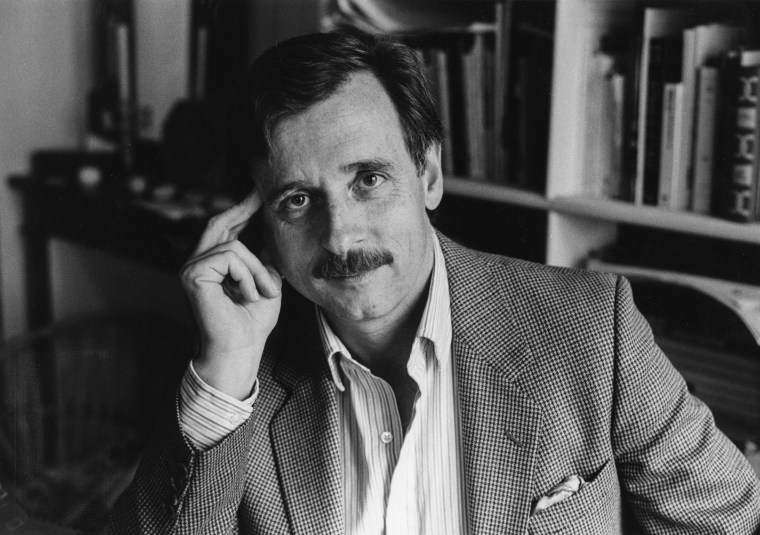
As he wrote in “A Boy’s Own Story,” he knew as a child that he was attracted to boys, but for years was convinced he must change — out of a desire to please his father (whom he otherwise despised) and a wish to be “normal.” Even as he secretly wrote a “coming out” novel while a teenager, he insisted on seeing a therapist and begged to be sent to boarding school. One of the funniest and saddest episodes from “A Boy’s Own Story” told of a brief crush he had on a teenage girl, ended by a polite and devastating note of rejection.
“For the next few months I grieved,” White writes. “I would stay up all night crying and playing records and writing sonnets to Helen. What was I crying for?”
He had a whirling, airborne imagination and New York and Paris had been in his dreams well before he lived in either place. After graduating from the University of Michigan, where he majored in Chinese, he moved to New York in the early 1960s and worked for years as a writer for Time-Life Books and an editor for The Saturday Review. He would interview Tennessee Williams and Truman Capote among others, and, for some assignments, was joined by photographer Robert Mapplethorpe.
Socially, he met Burroughs, Jasper Johns, Christopher Isherwood and John Ashbery. He remembered drinking espresso with an ambitious singer named Naomi Cohen, whom the world would soon know as “Mama Cass” of the Mamas and Papas. He feuded with Kramer, Gore Vidal and Susan Sontag, an early supporter who withdrew a blurb for “A Boy’s Own Story” after he caricatured her in the novel “Caracole.”
“In all my years of therapy I never got to the bottom of my impulse toward treachery, especially toward people who’d helped me and befriended me,” he later wrote.
Early struggles, changing times
Through much of the 1960s, he was writing novels that were rejected or never finished. Late at night, he would “dress as a hippie, and head out for the bars.” A favorite stop was the Stonewall, where he would down vodka tonics and try to find the nerve to ask a man he had crush on to dance. He was in the neighborhood on the night of June 28, 1969, when police raided the Stonewall and “all hell broke loose.”
“Up until that moment we had all thought homosexuality was a medical term,” wrote White, who soon joined the protests. “Suddenly we saw that we could be a minority group — with rights, a culture, an agenda.”
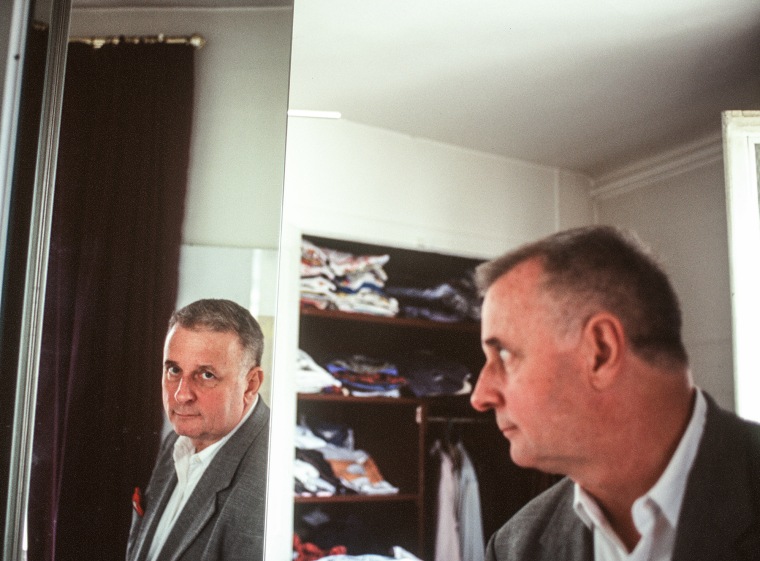
Before the 1970s, few novels about openly gay characters existed beyond Vidal’s “The City and the Pillar” and James Baldwin’s “Giovanni’s Room.” Classics such as William Burroughs’ “Naked Lunch” had “rendered gay life as exotic, marginal, even monstrous,” according to White. But the world was changing, and publishing was catching up, releasing fiction by White, Kramer, Andrew Holleran and others.
White’s debut novel, the surreal and suggestive “Forgetting Elena,” was published in 1973. He collaborated with Charles Silverstein on “The Joy of Gay Sex,” a follow-up to the bestselling “The Joy of Sex” that was updated after the emergence of AIDS. In 1978, his first openly gay novel, “Nocturnes for the King of Naples,” was released and he followed with the nonfiction “States of Desire,” his attempt to show “the varieties of gay experience and also to suggest the enormous range of gay life to straight and gay people — to show that gays aren’t just hairdressers, they’re also petroleum engineers and ranchers and short-order cooks.”
With “A Boy’s Own Story,” published in 1982, he began an autobiographical trilogy that continued with “The Beautiful Room is Empty” and “The Farewell Symphony,” some of the most sexually direct and explicit fiction to land on literary shelves. Heterosexuals, he wrote in “The Farewell Symphony,” could “afford elusiveness.” But gays, “easily spooked,” could not “risk feigning rejection.”
His other works included “Skinned Alive: Stories” and the novel “A Previous Life,” in which he turns himself into a fictional character and imagines himself long forgotten after his death. In 2009, he published “City Boy,” a memoir of New York in the 1960s and ’70s in which he told of his friendships and rivalries and gave the real names of fictional characters from his earlier novels. Other recent books included the novels “Jack Holmes & His Friend” and “Our Young Man” and the memoir “Inside a Pearl: My Years in Paris.”
“From an early age I had the idea that writing was truth-telling,” he told The Guardian around the time “Jack Holmes” was released. “It’s on the record. Everybody can see it. Maybe it goes back to the sacred origins of literature — the holy book. There’s nothing holy about it for me, but it should be serious and it should be totally transparent.”
Dorothy Allison, revered and award-winning lesbian feminist author, has died
Dorothy Allison, the lesbian feminist author of the novel Bastard Out of Carolinaand other noteworthy books, has died at age 75.
Allison, who had cancer, died Wednesday at her home in Northern California, Sinister Wisdomreports.
“Allison wrote about a queer, poor South with dynamism and ferocious love,” Literary Hub notes. “Her books tangoed frankly with historically taboo subjects, like sexual abuse, and spotlit characters under-glimpsed on the shelves of hegemony.”
Her books reflected her life. She was born in 1949 in Greenville, S.C. Her mother was just 15 years old, and Allison “had a difficult childhood marked by poverty and sexual, physical, and emotional abuse,” as Sinister Wisdom puts it. With the help of scholarships, she earned bachelor’s and master’s degrees, and she became involved in the feminist and lesbian rights movements in the 1970s and ’80s in Florida, Washington, D.C., and New York City.
She became editor of Amazing Grace, a feminist newspaper, and contributed poems and essays to LGBTQ+ and other publications. She served on the editorial board of Conditions, a lesbian feminist journal. “Sitting on the floor at editorial meetings talking about writing and manuscripts and how women might work toward a more just and equitable world, I looked around and felt my heart thudding between my breasts,” she wrote about Conditions in an essay for Sinister Wisdom. “I loved each and every one of us. I loved what we were trying to do even as we quibbled over line breaks in a poem or structure in an essay.”
In 1983, Allison published a chapbook of poetry, The Women Who Hate Me, and in 1988 came a collection of her short stories, Trash, which was honored with two Lambda Literary Awards and the American Library Association’s Award for Gay and Lesbian Writing. Allison “exposes with poetic frankness the complexities of being ‘a cross-eyed working-class lesbian, addicted to violence, language, and hope,’” Publishers Weeklywrote of Trash.
Bastard Out of Carolina, published in 1992, brought Allison widespread critical praise and a National Book Award nomination. It is the story of Ruth Anne Boatwright, nicknamed Bone, tracking her life up to age 13 in an impoverished family in Greenville, as Allison did, and being abused by her stepfather, as Allison was.
“The literary territory that Dorothy Allison has set out to explore is dangerous turf, a minefield strewn with booby traps where the least false step could lead to disaster,” George Garrett wrote in The New York Times.Those “booby traps” include stereotypes about the South and poverty, he explained. “It is a great pleasure to see her succeed, blithe and graceful as Baryshnikov in performance,” Garrett wrote.
The novel was adapted into a television movie starring Jena Malone as Bone and Jennifer Jason Leigh as her mother, Anney, and directed by Anjelica Huston. It aired on Showtime in 1996 after media mogul Ted Turner refused to air it on his outlets because of the graphic depictions of sexual abuse.
Allison’s second novel was 1998’s Cavedweller, which “gradually discloses the inner lives and secret histories of four bewildered, determined women who eventually come to understand themselves,” aKirkus Reviewscritic wrote, calling it “an altogether wonderful second novel.” It became a TV movie in 2004, starring Kyra Sedgwick, Aidan Quinn, and Kevin Bacon, and directed by Lisa Cholodenko.
Allison’s other works include the essay collection Skin: Talking About Sex, Class, & Literature (1994) and the memoir Two or Three Things I Know for Sure (1995). She was a prolific writer of erotica and helped found the Lesbian Sex Mafia, a women’s BDSM support and education group that is still active. She received the Publishing Triangle’s Bill Whitehead Award for Lifetime Achievement this year, among many other honors.
Allison’s wife, Alix Layman, preceded her in death. Survivors include her son, Wolf, and many friends.
“A Grand Love: Stories for Grandparents of Transgender Grandchildren” Author Janna Barkin Speaks at Petaluma Library November 16
Meet Janna Barkin on Saturday, November 16, at 10:30 am at the Petaluma Community Center! Barkin will read from her new book, A Grand Love: Stories for Grandparents of Transgender Grandchildren, followed by a Q&A.
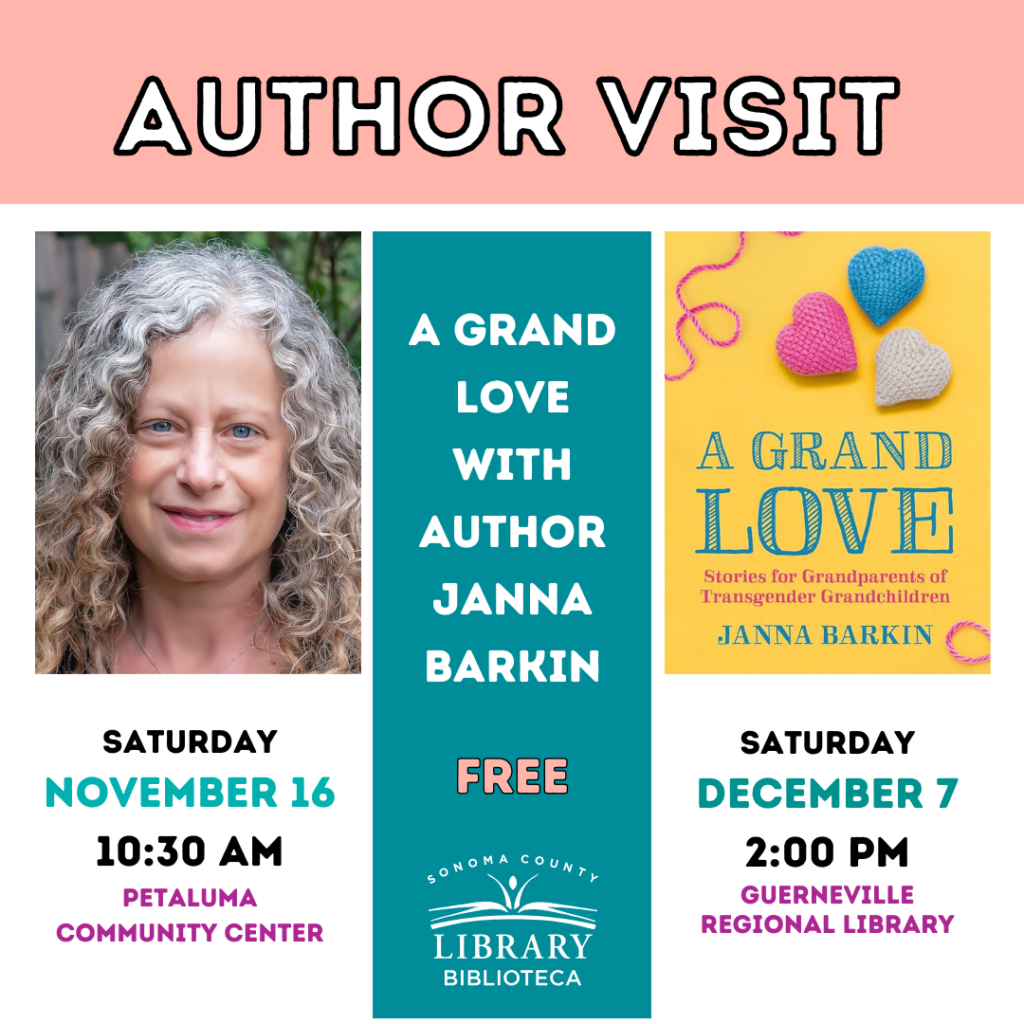
7th Annual Sonoma Valley Authors Festival Announces World-Class Lineup of Authors
The Sonoma Valley Authors Festival (SVAF) announces its impressive lineup of world-class authors and speakers for its seventh annual event on April 26-28, 2024, at the Fairmont Sonoma Mission Inn & Spa. The three-day event delivers a highly curated experience designed to “stimulate the minds and nurture the souls of readers.” This year’s speakers include: Doris Kearns Goodwin, David Grann, Hampton Sides, Amy Tan, Colm Tóibín, Jonathan Eig, Elliot Ackerman, Admiral James Stavridis, Kori Schake, Akhil Reed Amar, Dr. Deepak Srivastava, Wade Davis, Anita Gail Jones, Luis A. Miranda Jr., Craig Frazier, PBS NewsHour’s Jeffrey Brown, with more authors and speakers to be announced.
Founded in 2018 by Ginny and David Freeman as a 501(c)(3) non-profit public charity focused on education and community involvement, the Sonoma Valley Authors Festival has quickly become a must-attend event for those committed to enriching their lives through literature, learning, science, technology, and medicine.
Though the festival Pavilion is limited to 400 seats, the sponsors in those seats make substantial donations that fund the other free events – Students Day, Authors on the Plaza, the Virtual Festival, and special events that engage thousands of community members. The festival currently has a matching gift program in place to leverage all donations to help extend the reach of free access.
“The intimacy of the Sonoma Valley Authors Festival creates amazing synergies, where the audience is as interesting as the speakers!” says Ginny Freeman, one of the festival co-founders. “The festival audience is well-educated, well-traveled, and dedicated to lifelong learning and life enrichment. The atmosphere engages speakers and audiences alike, forming connections among audience members that are as equally magical as that of the audience and speakers.”
The festival’s programming offers a series of Ted Talk-style sessions in the main pavilion and breakout sessions. Over the three-day immersion weekend, attendees will hear from over 20+ authors from various literary genres who discuss advances being made in science, technology, and medicine.
The intimate setting of the Fairmont Sonoma Mission Inn & Spa provides the perfect environment for attendees to meet and interact with the 20+ authors and speakers. Return interviewer Jeffrey Brown, Senior Correspondent and Chief Arts Correspondent for PBS News-Hour, aptly describes the experience, “One of the nice things for the people who attend the festival is they get to talk to the authors. Not only hear them speak, but actually ask the authors their own questions – they can share what they like about the book, and in turn get to know the authors.”
Since the inception of the festival, Students Day at Sonoma Valley High School and other local schools, aims to inspire intellectual curiosity in the next generation. This April, over 1,400 young scholars will have the chance to meet and engage with speakers and receive free books written by the presenting authors. Each year, 3,000 to 4,000 books written are given free to the students, all supported by private donations. Due to campus safety protocols, Students Day is not open to the public.
In addition to the main event, SVAF hosts Authors on the Plaza, the free and open to the public event for the Sonoma community. The event is held on Saturday, April 27, from 11 a.m. to 2 p.m, under the trees on the lawn of the historic Sonoma Plaza. This year’s event will feature David Grann, Amy Tan and Colm Tóibín.
Three-day VIP Festival Passes start at $2,750 and include access to all presentations, two on-site breakfasts and lunches, an exclusive dinner with the authors, and free access to the Virtual Festival. More than 50% of each VIP pass is a tax-deductible donation. For more information about the 2024 Sonoma Valley Authors Festival and to purchase passes, please visit the website.
The Sonoma Valley Authors Festival is made possible through the generous support of individual donors, corporate sponsors, and committed volunteers. Co-founders Ginny and David Freeman have dedicated time and personal financial commitment to ensure the success of this non-profit 501(c)(3) organization.
About Sonoma Valley Authors Festival: The Sonoma Valley Authors Festival (SVAF) was founded in 2018 by Ginny and David Freeman as a 501(c)(3) non-profit public charity focused on education and community involvement. This annual event brings together literature enthusiasts and lifelong learners to engage with world-class authors of all genres and speakers in science, technology, and medicine. SVAF is supported by individual donors, corporate sponsors, and dedicated local volunteers. Past authors have included: Isabel Allende, Dave Barry, Bill Browder, Bonnie Garmus, Amor Towles, Billy Collins, and Abraham Verghese.
Occidental Center for the Arts Literary Series. Book Launch for Pink Paisley Scarf byMarylu Downing, Saturday, February 17
Saturday, February 17th 4-5:30PM Occidental Center for the Arts Literary Series. Book Launch for Pink Paisley Scarf byMarylu Downing. Vivid imagery, humor in the ordinary, and the complexities of intimate relationships propel Marylu Downing’s writing. Her most recent book, Pink Paisley Scarf is a work of fiction. Marylu, long time resident of the Occidental community, and board member at the inception of Occidental Center for the Arts now lives in Avila Beach, California with her husband Roger House. Selected readings, and conversation with Patrick Fanning, author, publisher and President of the OCA Board. Audience Q&A. Free admission, all donations gratefully accepted. Book sales and signing. Refreshments/Wine/Beer available for sale. Persian Love Cake available by donation. OCA: 3850 Doris Murphy Way, Occidental, at corner of Bohemian Hwy & Graton Rd. OCA’s facilities are accessible to people with disabilities. More info: occidentalcenterforthearts.org or 707-874-9392.
Anthony Christian Ocampo, Ph.D talks about his new book “Brown and Gay in LA: The Lives of Immigrant Sons”
Anthony Christian Ocampo, Ph.D. is Professor of Sociology at California State Polytechnic University, Pomona. He is the author of The Latinos of Asia: How Filipino Americans Break the Rules of Race and his new book Brown and Gay in LA: The Lives of Immigrant Sons. Thank you for joining us this evening Anthony and congratulations on the publication of this incredible book.
Gary Carnivele chats with Anthony about his books and his work.
Occidental Center for the Arts Literary Series: An afternoon with local award-winning author Suzanne Maggio Sun. Feb. 12
Sunday, February 12th @ 2pm at Occidental Center for the Arts Literary Series: An afternoon with local award-winning author Suzanne Maggio as she shares selected readings and answers questions about her latest book, “Estrellas – Moments of Illumination along El Camino De Santiago”. Her debut memoir, The Cardinal Club, was a finalist in both the 2021 Next Generation Indie Book Awards and the 2020 IAN Book of the Year Awards. This is a free event, donations gratefully accepted. Fine refreshments and books for sale, author signing. 3850 Doris Murphy Way, Occidental, CA. OCA’s facilities are accessible to people with disabilities. For more info: occidentalcenterforthearts.org or 707-874-9392.
